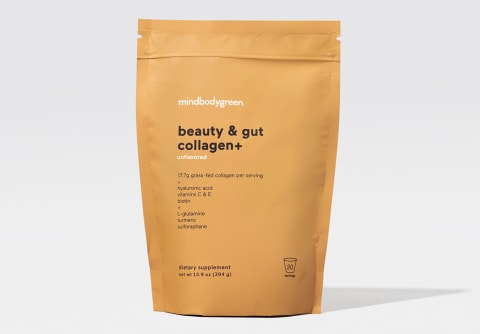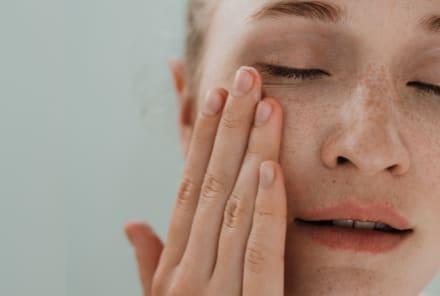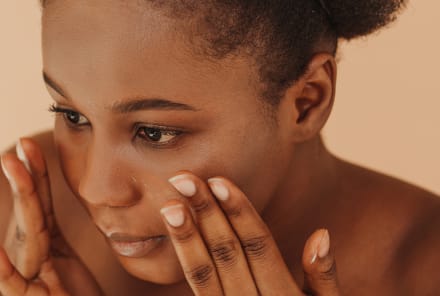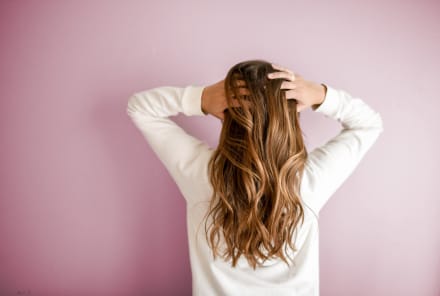Advertisement
Postpartum Hair Loss Is Temporary, But Here Are 5 Ways To Help Speed The Growth Process

Picture this: You all but reveled in the famous pregnancy "glow"—you've got the full, shiny locks to prove it!—only to find yourself pulling out clumps of strands post-childbirth. It's (likely) not from the added stress of caring for a newborn—you may be experiencing postpartum hair loss. You're certainly not alone: In fact, the American Pregnancy Association states the condition affects between 40% and 50% of women. Postpartum hair loss is a completely normal (and temporary!) condition—yet, you may be riddled with questions like, Will my hair ever grow back? When? And what can I do to speed up the process?
The answers? Yes, it depends, and it's worth focusing on standard hair care lessons. Here's everything you need to know, vetted by experts.
What is postpartum hair loss, anyway?
Technically, postpartum hair loss is actually called telogen effluvium—which refers to a temporary shedding of the hair. Basically, more hairs shift into the telogen (or resting) phase, which causes a growing number of strands to fall out.
What causes it?
Telogen effluvium can happen for a number of reasons: stress, a high fever, and an extreme change in diet, to highlight a few. But there's a specific reason it's earned the "postpartum hair loss" moniker: It typically happens after estrogen levels dip after pregnancy.
Perhaps you're familiar with the oft-cited "pregnancy glow." That's because "Pregnancy causes a spike in hormone levels including estrogen, progesterone, oxytocin, and prolactin," says hair restoration specialist Craig Ziering, D.O., FAOCD, FISHRS, FAAD, owner of Ziering Medical. "Blood volume also rises during pregnancy, as much as 50%1." As a result, many expecting mothers experience dewy, slightly-flushed skin and (you guessed it) a longer and thicker mane.
After childbirth, though, there's a quick drop in those hormones—with greater hair shedding a result. It's perhaps even more noticeable if you experienced a particularly full head of pregnancy locks, Ziering notes, but rest assured that it's a perfectly normal condition, and hair does grow back after some time. And for what it's worth: There's not much you can do to prevent postpartum hair loss (or predict whether it will happen to you).
How long does it last?
"The good news is that this kind of hair loss is reversible—it does grow back," says board-certified dermatologist Hadley King, M.D. While the hair loss typically peaks around three to four months after giving birth, your growth cycle should level out on its own within six to 12 months.
If it's been a full year and you haven't seen any improvement, you might want to visit a derm or hair specialist to make sure there isn't another underlying condition happening simultaneously, says Ziering.
5 ways to manage postpartum hair loss.
As for treatments, it's pretty much a waiting game, says board-certified dermatologist Iris Rubin, M.D., founder of SEEN Hair Care. However, there are ways to take care of the hair you do have while you're waiting for others to grow back. (As you may know by now: Happy and healthy hair tends to grow faster):
Avoid daily heat styling or chemical treatments.
"Being gentle with the hair is important," says Rubin. "When your hair is thinned, you want to preserve and keep the hair you have in the best condition." That said, you might want to avoid blasting the strands with hot tools or chemically based treatments, at least until the shedding ceases.
Get your fill of vitamins.
While you can't exactly prevent postpartum hair loss, you can make sure you're getting enough vitamins and nutrients (namely, vitamin B, folate, iron, and omega-3 fatty acids), which Ziering notes can support hair growth—postpartum or otherwise. King agrees: "Make sure you don't have any vitamin or mineral deficiencies," she notes.*
Manage your sleep and stress.
"Perhaps easier said than done with an infant, but try to manage stress and sleep as well as possible," says Ziering. "The body does its best cellular function, repair, and restoration overnight." It's true: We have the highest cellular activity in the skin while we sleep, so all the collagen repair and antioxidant activity (which helps support hair growth) happen during some restful shut-eye.
Avoid too-tight hairstyles.
Tight buns, ponies, or braids can cause friction and pulling, which can lead to a whole other hair loss issue (called traction alopecia, in medical terms). To minimize even more shedding, you may want to stick to soft elastics or wear one of these gentler styles to pull your hair back.
Be gentle with your hair and scalp.
Similar to avoiding any friction, you'll also want to steer clear of other forms of physical stress (i.e., harsh brushing, shampooing too aggressively, and sleeping on sopping wet hair) that can damage your strands. Essentially, the overarching theme is to take care of the hair you have; do so, and the inches should follow.
The takeaway.
Postpartum hair loss is quite common. And while there's not much you can do to prevent or treat the shedding hairs themselves (it's pretty much a waiting game, but it does grow back!), you can support the hair you do have to foster speedier growth. The good news is, even if you choose to do nothing at all (understandable—you do have a newborn to care for, after all), your hair should return to its normal volume on its own—it just takes some time.
Watch Next
Enjoy some of our favorite clips from classes
Enjoy some of our favorite clips from classes
What Is Meditation?
Mindfulness/Spirituality | Light Watkins
Box Breathing
Mindfulness/Spirituality | Gwen Dittmar
What Breathwork Can Address
Mindfulness/Spirituality | Gwen Dittmar
The 8 Limbs of Yoga - What is Asana?
Yoga | Caley Alyssa
Two Standing Postures to Open Up Tight Hips
Yoga | Caley Alyssa
How Plants Can Optimize Athletic Performance
Nutrition | Rich Roll
What to Eat Before a Workout
Nutrition | Rich Roll
How Ayurveda Helps Us Navigate Modern Life
Nutrition | Sahara Rose
Messages About Love & Relationships
Love & Relationships | Esther Perel
Love Languages
Love & Relationships | Esther Perel


















